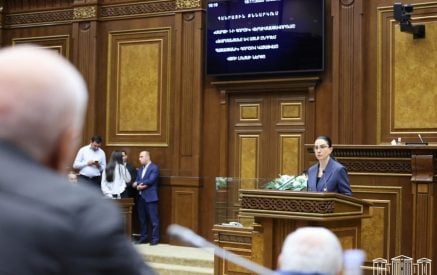The European Court of Human Rights will deliver an advisory opinion (No. P16-2019-001) in writing
on 29 May 2020 at 11 a.m.
The case concerns the interpretation of a provision in the Criminal Code of Armenia of 2009 on the
overthrow of the constitutional order and its application in the light of Article 7 (no punishment
without law) of the European Convention on Human Rights in the context of a case against former
President Robert Kocharyan.
Mr Kocharyan has been charged under Article 300.1 of the 2009 Criminal Code (entitled “Overthrow
of the Constitutional order”) with offences which were alleged to have been committed in relation
to events which took place in February and March 2008, when protests broke out over a disputed
presidential election. At that time, a different provision of the former Criminal Code, Article 300
(“usurpation of power”), was in force.
…
Read also
A request from the Constitutional Court of Armenia for an advisory opinion, the second since the
entry into force of Protocol No. 16 to the European Convention on Human Rights on 1 August 20181,
was introduced on 2 September 2019.
It was accepted by the Panel of the Grand Chamber on 2 October and a Grand Chamber was formed
on 7 October in accordance with Rule 24 § 2 (h) of the Rules of Court.
The questions asked by the Constitutional Court were worded as follows:
“1) Does the concept of ‘law’ under Article 7 of the Convention and referred to in other Articles of
the Convention, for instance, in Articles 8-11, have the same degree of qualitative requirements
(certainty, accessibility, foreseeability and stability)?
2) If not, what are the standards of delineation?
3) Does the criminal law that defines a crime and contains a reference to certain legal provisions of
a legal act with supreme legal force and higher level of abstraction meet the requirements of
certainty, accessibility, foreseeability and stability?
4) In the light of the principle of non-retroactivity of criminal law (Article 7 § 1 of the Convention),
what standards are established for comparing the criminal law in force at the time of committal of
the crime and the amended criminal law, in order to identify their contextual (essential) similarities
or differences?”
The Grand Chamber will deliver its opinion in writing on 29 May 2020 at 11 a.m.
This press release is a document produced by the Registry. It does not bind the Court. Decisions,
judgments and further information about the Court can be found on www.echr.coe.int. To receive
1. Protocol No. 16 allows the highest courts and tribunals, as designated by the member States which have
ratified this text, to request the Court to give advisory opinions on questions of principle relating to the
interpretation or application of the rights and freedoms defined in the Convention or its protocols.
The European Court of Human Rights was set up in Strasbourg by the Council of Europe Member
States in 1959 to deal with alleged violations of the 1950 European Convention on Human Rights.

























































